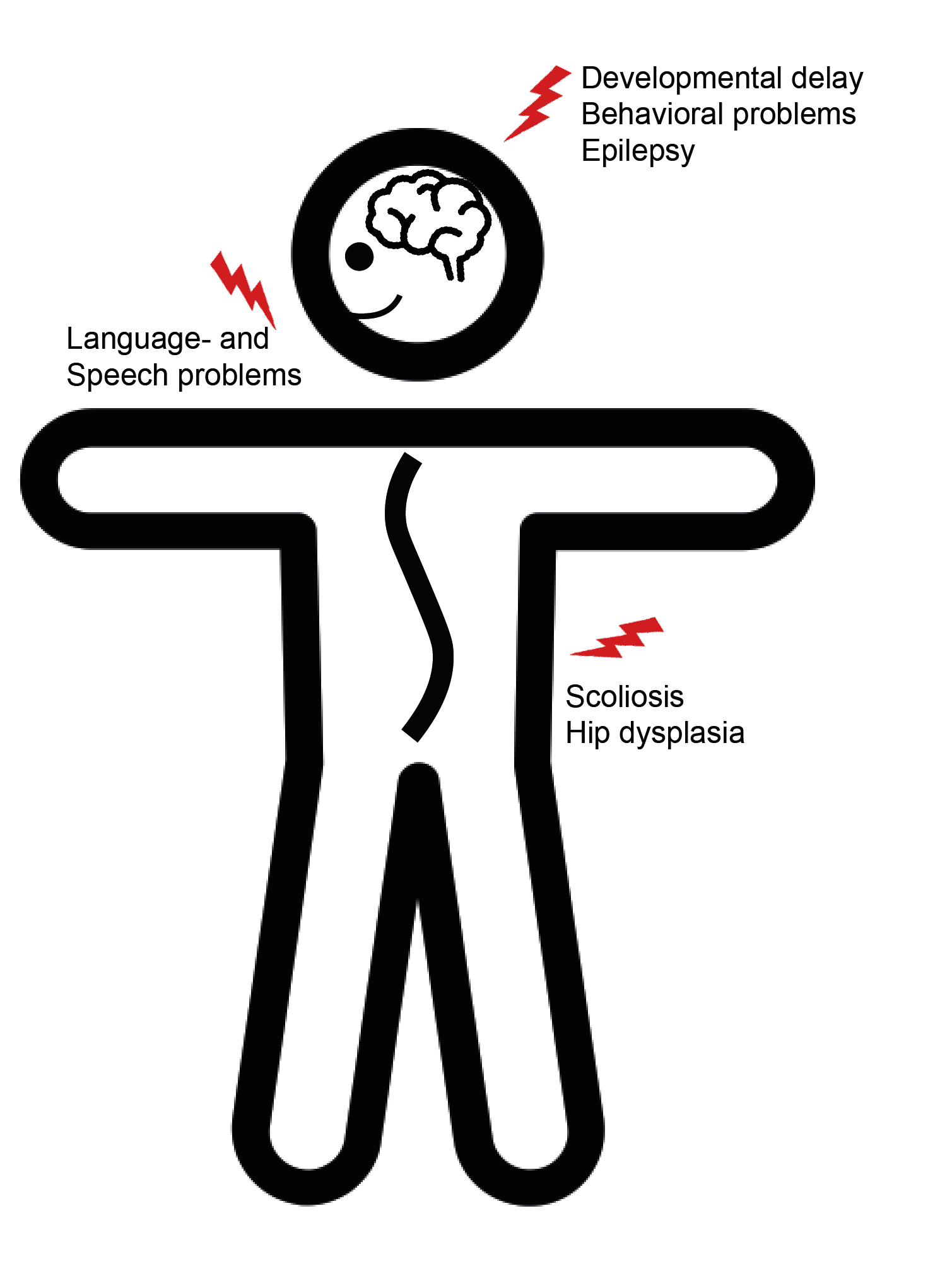What is SYNGAP1 Syndrome?
 The SYNGAP1 Syndrome is a genetic condition that was first described in 2009. In the SYNGAP1 Syndrome, the development and function of the brain are adversely affected. Important characteristics are a developmental delay with language and speech delay and an intellectual disability. Epilepsy is common in varying degrees of severity. A group of children has strikingly severe epilepsy from a young age. In addition, more than 50% of affected persons are diagnosed with an autism spectrum disorder. In three quarters of the patients, there is also problematic behavior, involving aggression, self-harm, tantrums, mood problems and impulse control problems. Hip dysplasia, scoliosis and movement disorders such as ataxia and hypotonia are common health problems.
The SYNGAP1 Syndrome is a genetic condition that was first described in 2009. In the SYNGAP1 Syndrome, the development and function of the brain are adversely affected. Important characteristics are a developmental delay with language and speech delay and an intellectual disability. Epilepsy is common in varying degrees of severity. A group of children has strikingly severe epilepsy from a young age. In addition, more than 50% of affected persons are diagnosed with an autism spectrum disorder. In three quarters of the patients, there is also problematic behavior, involving aggression, self-harm, tantrums, mood problems and impulse control problems. Hip dysplasia, scoliosis and movement disorders such as ataxia and hypotonia are common health problems.
What Causes SYNGAP1 Syndrome?
The SYNGAP1 Syndrome occurs when the SYNGAP1 protein (synaptic Ras-GTPase activating protein 1) that the body makes is absent or does not work properly. The SYNGAP1 protein plays an important role in nerve cells in the brain. The “recipe” for the production of the SYNGAP1 protein is stored in our genetic material, the DNA. The DNA contains the genetic code for our hereditary characteristics, the genes. The DNA is packed in chromosomes. In the SYNGAP1 Syndrome the error is in the SYNGAP1 gene on chromosome 6. Normally people have two copies of this. In people with SYNGAP1 Syndrome one of the two copies is missing or one of the two copies is not working due to a small change in the gene. Usually the genetic defect develops at the time of fertilization. Then there is a small risk of recurrence. It is important to have this investigated.
How common is SYNGAP1 Syndrome?
SYNGAP1 Syndrome is a rare condition. Worldwide there are now about 500 known patients. However, with the advent of new genetic research techniques such as whole exome sequencing, SYNGAP1 Syndrome is increasingly being discovered. Not all patients are likely to be detected because the characteristics are not specific. It is estimated that 1% of intellectual disability is caused by a mutation in the SYNGAP1 gene.
The SYNGAP1 Expertise Center is a partnership between ENCORE and Zuidwester and is in full development. The SYNGAP1 consultation hour for both children and adults runs through the VG clinic of Zuidwester(click here for more information). You can also contact us via secretariaatpolikliniek@zuidwester.org.
At the outpatient clinic, people are assessed medically and behaviorally, additional research can be carried out and ideas are given as to how optimal care can be organised. If necessary, children are referred to a specialist with more experience in the field of hereditary disorders. We work together as much as possible with the locally involved practitioner.
For adults, research is currently underway into the course of SYNGAP1 syndrome in adulthood. The research is coordinated by Doctor Kattentidt and Doctor Kersseboom (Zuidwester) in collaboration with ENCORE and Toronto Western Hospital, University Health Network, Toronto, Canada. If you are interested in participating, we would like to invite you to contact us at secretariaatpolikliniek@zuidwester.org.
Dr. Rogier Kersseboom, GDPR doctor and clinical geneticist
Drs. Anja Kattentidt, GDPR doctor and clinical geneticist
Click here to go to the contact form or mail yourself to: secretariaatpolikliniek@zuidwester.org
In order to provide the best possible care to patients with a rare condition, it is essential that global knowledge about the condition is gathered. Nationwide, centers of expertise have been set up to stimulate care for rare disorders and to gather knowledge. For the formal recognition of an expertise center by the Ministry of Health, an important condition is that the expertise center gathers, analyzes and shares knowledge through publications. These can be publications in scientific journals, but also treatment guidelines for health care professionals or information brochures for patients or caregivers. We optimize care and research within ENCORE through standardized follow-up and close collaboration between doctors and researchers. That way, we can ultimately develop better treatments for rare conditions. You may therefore be asked to participate in research. Participation in research is always on a voluntary basis. The data obtained is stored and analyzed in an anonymous form. All research has been approved in advance by an ethics review committee.
To learn more about SYNGAP1 Syndrome research at ENCORE, click here
There is an international patient organization for people with SYNGAP1 Syndrome, click here to go to the website.
There is also a Dutch Facebook group of parents with a child with SYNGAP1 Syndrome, click here to go to the Facebook page.
